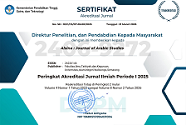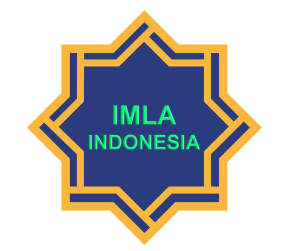Desain Pengembangan Kurikulum Pembelajaran Bahasa Arab pada Tujuan Khusus Pemandu Wisata (Tour Guide)
DOI:
https://doi.org/10.21580/alsina.1.2.4280Keywords:
kurikulum, pembelajaran Bahasa Arab, tujuan khusus pemandu wisataAbstract
Language Arabic, which has now become an international language, has a big contribution in developing science. This Tern shows the existence of active Arabic communication with the languages that exist in this world. By using a language that is understood together, one can establish social relations in the community. The purpose of this study is to design Arabic learning curriculum development specifically for the purpose here of tourism as a tour guide. This research method used library research. The results of the research show that the design learning of Arabic curriculum development is a special purpose tour guide, a tour guide is more, able, fluent and professional in communicating Arabic and knows the ins and outs of the world of tourism, as well as the destination when dealing with tourists from the Middle East.Downloads
References
Abdullah dan Safarani, Pengembangan Kurikulum, Jakarta: Raja Grafindo Persada, 2014.
Ahmad, Pengembangan Kurikulum, Bandung: Pustaka Setia, 1998.
Arifin, Zainal, Konsep dan Model Pengembangan Kurikulum, Bandung: Remaja Rosdakarya,2011.
Asrori, Muhammad, Pengembangan Kurikulum Bahasa Arab Di Pesantren, Malang: Uin-Malang Pres, 2013.
Bahri, Syamsul, Pengembangan Kurikulum Dasar Dan Tujuanya, Jurnal Ilmiah Islam Future, Vol. XI No. 1 Agustus 2011.
Brown, Douglas, Prinsip Pembelajaran Dan Pengajaran Bahasa, Jakarta: Pearson Education, 2007.
Ernawati, Euis, Perencanaan Pembelajaran Bahasa Arab Di Perguruan Tinggi Pariwisata, Jurnal Pendidikan Bahasa Arab Dan Kebahasaaraban, Vol. 5 Juni 2018.
Gumanti, Tatang Ary, Yunidar, dan Syahruddin, Metodologi Penelitian Pendidikan, Jakarta: Mitra Wacana Media, 2016.
Hartono, Pendidikan Integrasi, Purwokerto: Stain Pres, 2011.
Hamalik, Oemar, Menejemen Pengembangan Kurikulum, Bandung: Rosda Karya, 2012.
Hidayat, Sholeh, Kurikulum Baru, Bandung: Remaja Rosdakarya, 2013.
Indah, Rohmani Nur dan Abdurrahman, Psikolinguistik, Konsep dan Isu Umum, Malang: IKAPI, 2008.
Maksudin, dan Qoim Nurani, Pengembangan Kurikulum Pembelajaran Bahasa Arab, Yogyakarta: Pascasarjana FITK UIN SUKA, 2018.
Manab, Abdul, Manajemen Perubahan Kurikulum , Yogyakarta: Kalimedia, 2015.
Muhajir, Arah Baru Pengajaran Bahasa Arab, Yogyakarta: FITK UIN Sunan Kalijaga, 2018.
Muljadi dan Andi Hermawan, Kepariwisataan Dan Perjalanan, Jakarta:Rajagrafindo Persada, 2016.
Riana, Cepy, Kurikulum dan Pembelajaran, Jakarta :Raja Grafindo Persada, 2014.
Rodjinandari, Nanny dan Bambang Supriadi, Kompetensi Pendampingan Pemandu Wisata Local Sebagai Developers Of People, Jurnal Pesona, Vol.2 Desember 2016.
Sanjaya, Wina, Strategi Pembelajaran Berorientasi Standart Proses Pendidikan, Jakarta: Kencana, 2007.
Sedarmayanti, Membangun Dan Mengembangkan Kebudayaan Industry Pariwisata, Bandung: Refika Aditama, 2014.
Setiyadi, Bambang, Metode Penelitian Untuk Pengajaran Bahasa Asing, Yogyakarta: Graha Ilmu, 2006.
Soetopo, Hendyat dan Wasty Soemanto, Pembinaan dan Pengembangan Kurikulum, Jakarta: Ikapi, 1986.
Sukmadinata, Nana Syaodih, Pengembangan Kurikulum, Bandung: Remaja Rosdakarya, 2012.
Supriono, Analisis Deskripsi Potensi Pariwisata Kota Batam Dalam Rangka Menjaring Wisatawan Manca Negara, Jurnal Pariwisata Terapan, Vol. 1 No. 1 2017.
Tuerah, Ignatius Javier dan Jeane Tuilan, Pelatihan Bahasa Inggris Pada Pemandu Wisata di Manado, Jurnal Pengabdian Kepada Masyarakat Bidang Kewirausahaan, Vol.1 November 2017.
Wena, Made, Strategi Pembelajaran Inovatif Kontemporer, Jakarta: Sinar Grafika Offset, 2009.
Zaini,Muhammad, Pengembangan kurikulum, Yogyakarta: Teras, 2009.
Zulhannan, Teknik Pembelajaran Bahasa Arab Interaktif, Jakarta: Rajagrafindo Persada, 2014.
Zed, Mestika, Metode Penelitian Kepustakaan, Jakarta: Yayasan Obor Indonesia, 2003.
Downloads
Published
How to Cite
Issue
Section
License
Copyright
The copyright of the received article shall be assigned to the publisher of the journal. The intended copyright includes the right to publish the article in various forms (including reprints). The journal maintains the publishing rights to published articles. Authors are allowed to use their articles for any legal purposes deemed necessary without written permission from the journal, but with an acknowledgment to this journal of initial publication.
Licensing
In order for Alsina: Journal of Arabic Studies to publish and distribute research articles, the editors need publishing rights (transferred from author to publisher). This agreement relates to the transfer/publishing copyright license to Alsina: Journal of Arabic Studies but the authors still have significant rights to use and share their published articles.
Alsina: Journal of Arabic Studies supports the need for writers to share, disseminate and maximize the impact of their research and their rights on any database. As a journal article writer, you have the right to various uses of your articles, including that by the institution or company where you work. Copyright can be used without the need for special permission. Authors who publish articles in the Alsina: Journal of Arabic Studies have broad rights to use their work for teaching and scientific purposes without requesting permission, including:
- Use by the author for lectures, presentations, or conferences, with distribution of copies to participants;
- Distribution to colleagues for research use;
- Use in compilations of the author's subsequent work;
- inclusion in a thesis or dissertation;
- Reuse of sections or excerpts from articles in other works (with full acknowledgment of the final article);
- Preparation of derivative works (other than commercial purposes) (with full acknowledgment of the final article);
- Voluntary posting on open websites operated by authors’ or writers' agencies for scientific purposes
When submitting a manuscript, authors do so on the understanding that if accepted for publication, the copyright for publishing (publishing right) of the article shall be assigned/transferred to Alsina: Journal of Arabic Studies.
Authors whose articles are accepted for publication will receive confirmation via email and sent a Copyright Transfer Agreement.


 Accreditation
Accreditation 
 In Collaboration with
In Collaboration with 

 Visitors
Visitors  Article Template
Article Template





